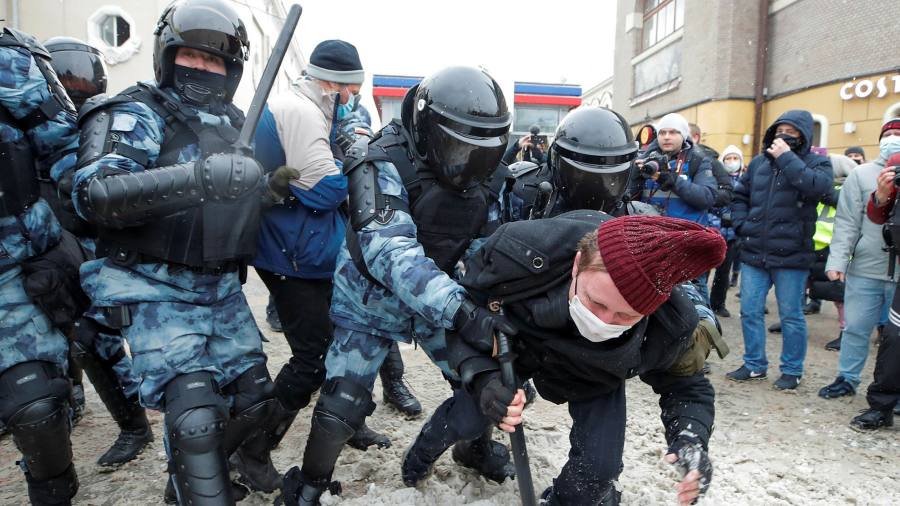[ad_1]
The writer, founder of R. Politik, a political analysis firm, is a non-resident scholar at the Carnegie Moscow Center
The prison sentence for Russian opposition leader Alexei Navalny handed down by a Moscow court last week is an even more radical move than last year’s attempt to poison him. By putting Navalny behind bars for at least two and a half years, Vladimir Putin’s regime is creating far greater risks for itself than if it had managed to secretly do away with him.
The Navalny imbroglio is a microcosm of the problems that have enveloped the Kremlin in recent years. Since the 2014 annexation of Crimea and breakdown in relations with the west, Putin has been consumed by geopolitics while fobbing off day to day governing to a group of faceless technocrats.Â
Putin’s original success was rooted in his regime’s ability to deliver steady improvements in living standards while inspiring Russians with exploits on the world stage. Now the regime is ruling largely by scaring people and fostering the impression that Mother Russia is once again a “besieged fortressâ€.
Can such hard-edged tactics work while the government continues to ignore the socio-economic and public health challenges unleashed by the pandemic? Falling real incomes and a recent increase in the retirement age have fuelled the social discontent that spilled on to the streets after Navalny’s arrest.
Back in 2013, when the fraud case against Navalny first came to trial, the Kremlin’s political team was smart enough to recognise that a long prison term would only make him a hero. He escaped with a suspended sentence.
Now the time for fun and games is over. The clever spin-doctors and masters of political manipulation who thrive in the make-believe world of Russian politics are no longer in charge. Now anti-Putin activities are matters of national security and the preserve of the hard men who run the Federal Security Service (FSB), successor to the KGB.
The Kremlin has become far more confrontational towards the west, and it is often publicly rude about foreign countries’ “warnings†or “concernsâ€. Last week, while the EU’s foreign policy chief Josep Borrell was in Moscow, Russia expelled diplomats from Germany, Sweden and Poland for the supposed offence of attending anti-Putin protests. Foreign minister Sergei Lavrov referred to the EU as “an unreliable partnerâ€. Essentially, Borrell was treated as the representative of a hostile force.
The August 2020 attempt on the life of Navalny — whose viral exposés of corruption have long made him a thorn in the Kremlin’s side — set in motion events that threaten to destabilise the entire system. Having miraculously survived, Navalny made a dramatic return to Russia and simultaneously released his online investigation alleging that a grotesquely expensive palace on the Black Sea was linked to Putin.Â
Independent polls in November 2020 showed that only 2 per cent of Russians were prepared to vote for Navalny in a presidential election. By late January, that had risen to 5 per cent, although attitudes remain conflicted. His arrest has transformed him into a victim of injustice and a truly national-level challenge to Putin. Presidential elections are not scheduled until 2024, but this is the first time Putin has had to deal with a real opponent. The Kremlin is no longer capable of deflecting popular discontent and rendering it harmless.
The FSB does not think in terms of political logic or polling data. It resorts to what it does best: repression, prosecutions, kangaroo courts and threats. The Kremlin’s enforcers have the resources to keep on arresting protesters, putting them on trial and threatening anyone who dares speak out. But they no longer care about offering a credible vision of where Putin wants to take the country.
Russia’s socio-economic problems are unpleasant but hardly insurmountable. But the regime cannot muster a halfway decent response. Eighty per cent of the public views the authorities as completely and irredeemably corrupt. The Kremlin has become ossified, and Putin cannot bring himself to launch serious reforms. That leaves only tried-and-true options: the endless search for enemies within, pressure on social media platforms and conspiracy-mongering about foreign adversaries.Â
The drama surrounding Navalny’s poisoning was the fuse, but the fire it lit is being fed by the public’s fatigue and frustration with the Putin regime and its inability to change. By refusing any dialogue with its opponents and the public, the regime all but guarantees that social tensions will morph into political protest. Either the regime must find the wisdom to be more flexible, or it will become an unambiguously repressive state. The latest events set Russia firmly on track to the latter destination.Â
The writer, founder of R. Politik, a political analysis firm, is a non-resident scholar at the Carnegie Moscow Center
[ad_2]
Source link





